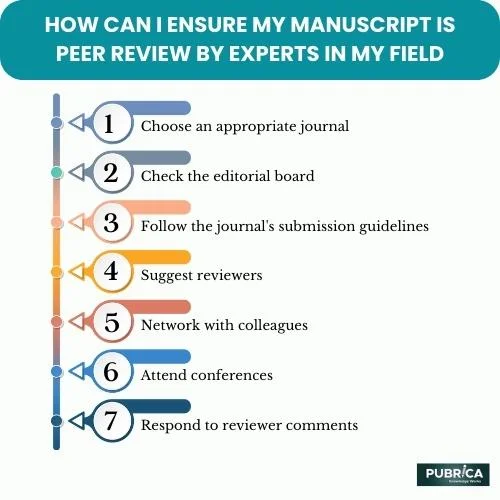
Where Should Manuscripts Be Submitted Review of Journal Submission Approaches
June 16, 2023
In Academic Journals, How Are Manuscripts Usually Peer-Reviewed?
July 3, 2023How Can I Ensure My Manuscript Is Peer Review By Experts In My Field
How Can I Ensure My Manuscript Is Peer Review By Experts In My Field
Peer review is the independent evaluation of your research article by subject matter experts in your area. The goal of Manuscript peer review is to determine the quality and acceptability of an article for publication. Peer review not only serves as a kind of quality control for academic publications, but it is also a valuable source of feedback for you. You may utilize the input before your paper is published to improve it.
How do I get my research peer-reviewed
The peer review process begins when you submit your manuscript to a journal. Following submission, your article will be evaluated by independent experts in your area. The reviewers will judge your work’s legitimacy, importance, and originality.
You can ensure your manuscript example is peer-reviewed by experts in your field by following these steps:
- Choose an appropriate journal: Look for journals that are relevant to your field of study and have a good reputation for publishing high-quality peer-reviewed research.
- Check the editorial board: Check the journal’s editorial board to see if they have experts in your field. This will show you whether the journal will likely have peer reviewers’ examples with relevant expertise.
- Follow the journal’s submission guidelines: Make sure you follow the journal’s submission guidelines carefully. This will increase the likelihood of your manuscript review being considered by the journal’s editorial team on how to write a peer review.
- Suggest reviewers: When you submit your manuscript writing, you may be allowed to suggest potential reviewers. Choose experts in your field who you believe could provide valuable feedback on your research.
- Network with colleagues: Network with colleagues in your field who have published in relevant journals. They may be able to suggest journals and potential PubMed peer reviewers for your manuscript.
- Attend conferences: Attend conferences in your field to network with other researchers and editors of academic journals. This can help you to establish relationships with potential peer-reviewed articles.
- Respond to reviewer comments: Respond carefully and respectfully if your illuminated manuscripts are accepted for peer review. This will increase the likelihood of your manuscript being accepted for publication.
By following these steps, you can increase the chances of your manuscript being peer-reviewed by experts in your field.

Do Not Forget the Rules for Reviewing Manuscripts in General
There are unique concerns when reviewing literature reviews, but all standard manuscript review guidelines apply, such as controlling conflicts of interest and devoting adequate time. Separate the evaluation of language and grammar from the more crucial evaluation of scientific merit, and keep in mind that expert reviewers risk introducing biases into the peer-review process.
Use our free guide to discover how to get the most out of How to critically peer review a systematic review manuscript.
Conclusion
A rigorous peer review by experts in your field is crucial for the credibility and quality of your research. To increase the likelihood of attracting knowledgeable reviewers, select a reputable journal with an editorial board of experts in your field—network with colleagues and researchers to establish connections. Cite influential works and respected scholars, and suggest potential reviewers if allowed. Craft a well-written manuscript with clarity, organization, and scientific rigor to attract experts in your field. Remember, the final decision lies with the journal’s editors, and be prepared for potential selection by other researchers.
About Pubrica
Pubrica meets summit standards and protocols of journal publishing ethics in every single phase of services and processes. Pubrica adheres to authorship guidelines drafted by the International Council of Medical Journal Editors (ICJME), and the scope for services will be routinely updated as per the Committee of Publication Ethics (COPE) and International Society of Medical Publication Professionals guidelines (ISMPP).
References
Byrne, Jennifer A. “Improving the peer review of narrative literature reviews.” Research integrity and peer review 1 (2016): 1-4.

14 years of expertise in clinical research with a doctoral distinction in life science.


